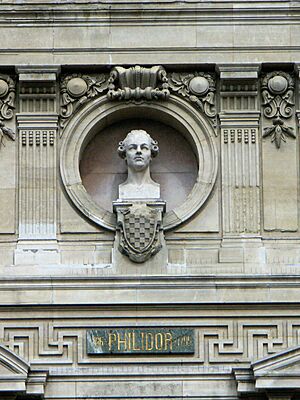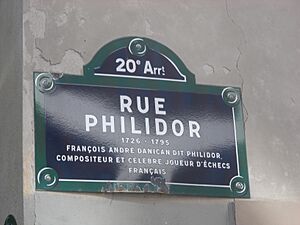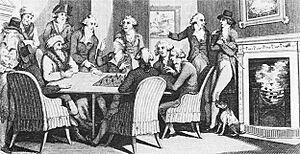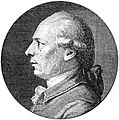François-André Danican Philidor facts for kids
Quick facts for kids
François-André Danican Philidor
|
|
|---|---|
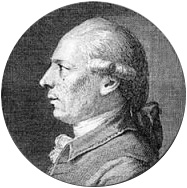
1777 portrait
|
|
| Born |
François-André Danican Philidor
7 September 1726 Dreux, France
|
| Died | August 31, 1795 (aged 68) London, England
|
| Signature | |
 |
|
François-André Danican Philidor (born September 7, 1726 – died August 31, 1795) was a very talented French man. He was a famous composer who wrote music, and also one of the best chess players of his time!
He helped create a type of French opera called opéra comique, which is like a play with songs. In the chess world, he was known as the strongest player. His book, Analyse du jeu des Échecs (which means Analysis of the Game of Chess), was used by chess players for over 100 years. Some important chess ideas, like a special opening move, an endgame position, and a way to checkmate, are all named after him!
Contents
A Family of Musicians
François-André Danican Philidor came from a well-known family of musicians. Their original family name was Danican. But François-André's grandfather, Jean Danican Philidor, got a special nickname from King Louis XIII. The king thought his oboe playing was so good, it reminded him of an Italian musician named Filidori. So, he started calling Jean "Philidor," and the name stuck!
Philidor's Music Career
When Philidor was just 6 years old, in 1732, he joined the royal choir of King Louis XV. He tried writing his first song at age 11. It's said that King Louis XV loved listening to the choir almost every day. While waiting for the king, the singers would play chess to pass the time. This might be how Philidor first became interested in chess.
Around 1740, he started working in Paris as a musician, teacher, and music copyist. He even taught a Bohemian composer named Ludwig Wenzel Lachnith. During this time, he met a famous writer named Diderot, who called him 'Philidor the clever one'.
From 1745 to 1754, Philidor spent a lot of time in London. He had gone there after a concert tour in the Netherlands didn't work out. In London, he met other important people like Dr. Johnson and Dr. Burney.
He returned to Paris in 1754, determined to focus on writing music. Some people thought his music sounded too Italian because of his travels. However, he had many successes with his operas. His first big hit was Blaise le savetier in 1759. His three most famous works were Le sorcier (1764), Tom Jones (1765), and Ernelinde, princesse de Norvège (1767).
For a while, Philidor was one of France's top opera composers. He wrote over 20 opéras comiques and two serious operas called tragédies lyriques. He also composed other types of music, like songs and religious pieces.
Philidor also wrote music for Masonic groups. He was a member of a famous Parisian group called Les Neuf Soeurs. This group had a special society for musicians.
Philidor's Chess Career
Philidor started playing chess regularly around 1740 at the famous Café de la Régence in France. This was a very popular place for chess players. He even played there with his friend from America, Benjamin Franklin.
The best player in France at that time, Legall de Kermeur, taught Philidor. At first, Legall was so much better that he could play without one of his rooks and still win. But in just three years, Philidor became as good as Legall, and then even better!
In 1747, Philidor visited England and easily beat a strong player from Syria named Philipp Stamma. Philidor was so confident that he let Stamma make the first move in every game. He even counted all draws as wins for Stamma, but still won the match!
That same year, Philidor played many games with Sir Abraham Janssen, who was the best player in England. Janssen was probably the strongest player Philidor ever faced, besides Legall. Philidor said he could only give Janssen a small advantage (a pawn and the first move) and still win.
Philidor returned to France in 1754 after nine years away. He was now a much stronger player. In 1755, he played a match against his old teacher, Legall. Philidor won, proving he was the best player in the world.
Philidor often visited London to play chess. In 1774, Parloe's chess club was created, and Philidor became their main chess master. He played there every year from February to June until he died. He even played against George Atwood, a famous mathematician. Atwood was a very good amateur chess player.
One amazing thing Philidor did was play blindfold chess. This means he played without looking at the board! On May 9, 1783, he played three blindfold games at the same time in London. He even gave his opponents advantages. People were so amazed that they signed papers to prove it really happened, thinking future generations wouldn't believe it! Even at 67 years old, in 1793, he played and won two blindfold games at once.
Philidor was highly respected in both England and France for his musical and chess talents. He had many famous friends, including the French writers Voltaire and Rousseau, and the English actor David Garrick.
In December 1792, when he was 65, Philidor had to leave France for England. This was because of the French Revolution. His name was put on a list of people who were banned from France. This was probably because his family had always been close to the King's family, not because of his own political ideas.
Chess expert Andrew Soltis said that Philidor "was the best player in the world for 50 years." He believed Philidor was much better than anyone else alive at the time.
Another chess expert, Boris Alterman, said that Philidor understood modern chess ideas very well. He knew about the importance of passed pawns (pawns that can't be stopped by enemy pawns), good and bad pieces, having more space on the board, and the structure of pawns.
Philidor's great-nephew, Jacques François Mouret, also became a very good French chess player.
Analyse du jeu des Échecs
| This section uses algebraic notation to describe chess moves. |
In 1749, Philidor published his famous chess book, Analyse du jeu des Échecs. He released new versions in 1777 and 1790. This book was so important for chess knowledge that by 1871, it had been printed about 70 times! It was translated into many languages like English, Spanish, German, Russian, and Italian.
In his book, Philidor looked at nine different ways to start a chess game. Most of his ideas focused on building a strong defense in the center of the board using pawns. He was the first to truly understand how important pawns are in chess. His most famous advice was: "The pawns are the soul of chess."
He also explained how to play certain endgame positions, like a rook and bishop versus rook or a rook and pawn versus rook endgame. These ideas are still used by chess players today! The Philidor Defence (1.e4 e5 2.Nf3 d6) is a chess opening named after him.
Philidor's book was the first to give detailed advice on how to play the middle part of a chess game. It also explained chess strategy as a whole. He introduced ideas like blocking enemy pieces, planning ahead, making sacrifices to gain an advantage, and how pawns should move.
Some other chess players at the time had different ideas. They preferred more open and attacking games, using gambits (sacrificing pawns early). However, Philidor's book was still very influential. Even some of his students, who formed a group called the Société des Amateurs, discussed and commented on his work.
Famous Games
- Captain Smith vs. François André Philidor, London, 1790: This game shows Philidor's ideas about pawns and ends with a clever checkmate.
- François André Philidor vs. NN, Unknown, 1749: This game, possibly created by Philidor himself, shows how powerful passed pawns can be.
- François André Philidor vs "The Turk": Philidor also played against "The Turk," a famous chess-playing machine (which actually had a hidden human player inside!).
Philidor's Final Years
Philidor was in England when the French Revolution began. Because of his many important social connections, the new government in France put his name on a list of people who were banned. He died on August 31, 1795, in London. He was buried in St James, Piccadilly. Just a few days after he passed away, his family managed to get his name removed from the banned list.
Chess Ideas Named After Philidor
Philidor's name is used for three well-known chess topics:
- The Philidor Defence, an opening move he suggested.
- Philidor's Legacy, a special way to checkmate the king (though this idea was actually invented before Philidor).
- Philidor's position, several important endgame positions.
Battez Philidor! (Beat Philidor!)
There's a short opera called Battez Philidor! (Beat Philidor!) with music by Amédée Dutacq. It was first performed in 1882. The story takes place in 1777. A poor musician needs to beat Philidor at chess to win the heart of his girlfriend. Philidor agrees to lose to help him, but he gets distracted and wins the game anyway! Don't worry, everything still works out for the lovers in the end.
Works
Images for kids
See also
 In Spanish: François-André Danican Philidor para niños
In Spanish: François-André Danican Philidor para niños
 | Delilah Pierce |
 | Gordon Parks |
 | Augusta Savage |
 | Charles Ethan Porter |


